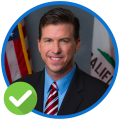Re-elect State Senator Josh Becker to keep SD-13 on the right track for progress.
Sen. Josh Becker’s track record and policy positions demonstrate that he will continue to be a progressive voice for the constituents of SD-13 and will govern effectively in the best interests of this diverse district.
Progressive endorsements: Sen. Becker has the endorsement of some progressive groups, including California Environmental Voters and SEIU United Healthcare Workers West.
Top issues: Clean energy, emissions reduction, voter protections, technology accessibility, mental health care, and criminal justice reform.
Priority bills: This year, Sen. Becker’s priorities for SD-13 have included 25 bills about energy efficiency, criminal justice reform, health care, environmental protections, and renewable energy. Of these, nine have been successfully chaptered into law and the rest remain in committee. This term, he has sponsored or passed legislation intended to improve criminal and environmental justice reforms. He co-authored SB81 to create more fairness and transparency in determinations of whether an individual is suited for release, SB474 to require that no more than a 35% markup be added to items sold in prison canteens, and SB448 to establish more equity in the process of considering a minor for release to home supervision. A longtime advocate for environmental and climate protections, he co-authored SB261 to require businesses with revenue over $500 million to produce biennial reports of their climate-related financial risk, and authored SB48 to establish a strategy for the use of energy-building data to track and manage the emission of greenhouse gas in the state. He scores a CS of 95 out of 100 on Courage Score, our annual analysis of legislators’ progressive voting records. Based on our Courage Score analysis, Sen. Becker has supported most progressive bills that made it to a vote. That said, Sen. Becker opposed SB679, which aimed to create the Los Angeles County Affordable Housing Solutions Agency to increase the development and preservation of housing across the region.
Committee leadership/membership: Sen. Becker currently sits on six committees, including Budget & Fiscal Review, Transportation, Joint Legislative Budget, and Business, Professions, & Economic Development. He serves as chair of the Senate Budget Subcommittee on Resources, Environmental Protection, and Energy. He also serves as vice chair of the California Legislative Jewish Caucus.
Governance and community leadership experience: Sen. Becker has served in this state Senate seat since 2020, when he was elected with over 75% of the vote.
Prior to his election to the state Senate, Sen. Becker was a public-policy leader, where he invested in supporting communities in economic opportunity, environmental sustainability, education, and health. In 2000, he created the Full Circle Fund, a community organization funding Bay Area nonprofits to create positive change. Additionally, Becker was appointed to the CA State Workforce Development Board for five years by Governor Jerry Brown, and later served the community of San Mateo on the Child Care Partnership Council. Becker also founded Clean Tech for Barack Obama, co-founded the Stanford Board Fellows program to train students to serve on the boards of local nonprofits, and co-founded New Cycle Capital.
Other background: Sen. Becker has lived in Menlo Park for over 20 years. He is a longtime supporter of business initiatives that create an ongoing social impact across communities.
The Race
Primary election: There are three candidates running in the March 5 primary, including Sen. Josh Becker (D), Alex Glew (R), and Maria Christina Laskowski (R). The top two vote recipients will advance to the general election on November 5.
Candidate fundraising and pledges: Sen. Becker’s campaign has raised $1.2 million as of October 2023, and is not funded by corporate PAC or fossil fuel interests.
Opposing candidate’s fundraising and pledges: The campaigns of Glew and Laskowski have not filed any campaign finance disclosures with the California Secretary of State’s office as of October 2023.
The District
Counties in district: California’s 13th State Senate District includes parts of San Mateo and Santa Clara Counties.
Voter registration: 54% Democrat, 14% Republican, and 26% No Party Preference. Democrats typically hold this district.
District demographics: 14% Latino, 26% Asian, and 3% Black.
Recent election results: SD-13 voted for Joe Biden for president in 2020 by 58 points and Gavin Newsom for governor in 2022 by 50 points.
The Position
State senators represent and advocate for the needs of their district constituents at the California State Capitol. They are responsible for creating, debating, and voting on legislation that addresses issues within their district.
The California State Senate has 40 districts. Each represents a population of about 930,000 Californians. Representatives are elected to the Senate for a four-year term. Every two years, half of the Senate's 40 seats are subject to election. Members elected before 2012 are restricted to two four-year terms (eight years) in the Senate. Those elected in or after 2012 are allowed to serve 12 years total across both the state Senate or Assembly. This term, Democrats currently hold a two-thirds supermajority of 31 seats in the California State Senate, while Republicans hold 9 seats.
Re-elect State Senator Josh Becker to keep SD-13 on the right track for progress.
Sen. Josh Becker’s track record and policy positions demonstrate that he will continue to be a progressive voice for the constituents of SD-13 and will govern effectively in the best interests of this diverse district.
Progressive endorsements: Sen. Becker has the endorsement of some progressive groups, including California Environmental Voters and SEIU United Healthcare Workers West.
Top issues: Clean energy, emissions reduction, voter protections, technology accessibility, mental health care, and criminal justice reform.
Priority bills: This year, Sen. Becker’s priorities for SD-13 have included 25 bills about energy efficiency, criminal justice reform, health care, environmental protections, and renewable energy. Of these, nine have been successfully chaptered into law and the rest remain in committee. This term, he has sponsored or passed legislation intended to improve criminal and environmental justice reforms. He co-authored SB81 to create more fairness and transparency in determinations of whether an individual is suited for release, SB474 to require that no more than a 35% markup be added to items sold in prison canteens, and SB448 to establish more equity in the process of considering a minor for release to home supervision. A longtime advocate for environmental and climate protections, he co-authored SB261 to require businesses with revenue over $500 million to produce biennial reports of their climate-related financial risk, and authored SB48 to establish a strategy for the use of energy-building data to track and manage the emission of greenhouse gas in the state. He scores a CS of 95 out of 100 on Courage Score, our annual analysis of legislators’ progressive voting records. Based on our Courage Score analysis, Sen. Becker has supported most progressive bills that made it to a vote. That said, Sen. Becker opposed SB679, which aimed to create the Los Angeles County Affordable Housing Solutions Agency to increase the development and preservation of housing across the region.
Committee leadership/membership: Sen. Becker currently sits on six committees, including Budget & Fiscal Review, Transportation, Joint Legislative Budget, and Business, Professions, & Economic Development. He serves as chair of the Senate Budget Subcommittee on Resources, Environmental Protection, and Energy. He also serves as vice chair of the California Legislative Jewish Caucus.
Governance and community leadership experience: Sen. Becker has served in this state Senate seat since 2020, when he was elected with over 75% of the vote.
Prior to his election to the state Senate, Sen. Becker was a public-policy leader, where he invested in supporting communities in economic opportunity, environmental sustainability, education, and health. In 2000, he created the Full Circle Fund, a community organization funding Bay Area nonprofits to create positive change. Additionally, Becker was appointed to the CA State Workforce Development Board for five years by Governor Jerry Brown, and later served the community of San Mateo on the Child Care Partnership Council. Becker also founded Clean Tech for Barack Obama, co-founded the Stanford Board Fellows program to train students to serve on the boards of local nonprofits, and co-founded New Cycle Capital.
Other background: Sen. Becker has lived in Menlo Park for over 20 years. He is a longtime supporter of business initiatives that create an ongoing social impact across communities.
The Race
Primary election: There are three candidates running in the March 5 primary, including Sen. Josh Becker (D), Alex Glew (R), and Maria Christina Laskowski (R). The top two vote recipients will advance to the general election on November 5.
Candidate fundraising and pledges: Sen. Becker’s campaign has raised $1.2 million as of October 2023, and is not funded by corporate PAC or fossil fuel interests.
Opposing candidate’s fundraising and pledges: The campaigns of Glew and Laskowski have not filed any campaign finance disclosures with the California Secretary of State’s office as of October 2023.
The District
Counties in district: California’s 13th State Senate District includes parts of San Mateo and Santa Clara Counties.
Voter registration: 54% Democrat, 14% Republican, and 26% No Party Preference. Democrats typically hold this district.
District demographics: 14% Latino, 26% Asian, and 3% Black.
Recent election results: SD-13 voted for Joe Biden for president in 2020 by 58 points and Gavin Newsom for governor in 2022 by 50 points.
The Position
State senators represent and advocate for the needs of their district constituents at the California State Capitol. They are responsible for creating, debating, and voting on legislation that addresses issues within their district.
The California State Senate has 40 districts. Each represents a population of about 930,000 Californians. Representatives are elected to the Senate for a four-year term. Every two years, half of the Senate's 40 seats are subject to election. Members elected before 2012 are restricted to two four-year terms (eight years) in the Senate. Those elected in or after 2012 are allowed to serve 12 years total across both the state Senate or Assembly. This term, Democrats currently hold a two-thirds supermajority of 31 seats in the California State Senate, while Republicans hold 9 seats.











